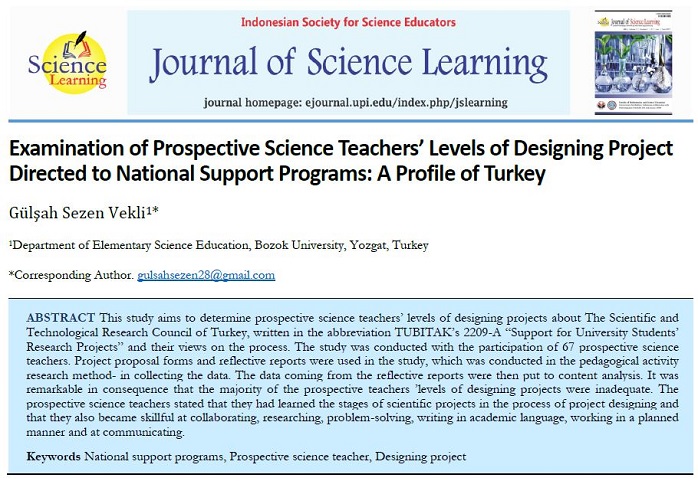
Examination of Prospective Science Teachers’ Levels of Designing Project Directed to National Support Programs: A Profile of Turkey
Abstract
Full Text:
Download PDFReferences
Baki, A., & Bütüner, S. Ö. (2009). Kırsal kesimdeki bir ilköğretim okulunda proje yürütme sürecinden yansımalar. İlköğretim Online, 8(1), 2-14.
Bencze, J. L. (2010). Promoting student-led science and technology projects in elementary teacher education: Entry into core pedagogical practices through technological design. International Journal of Technology and Design Education, 20(1), 43-62.
Camcı, S. (2008). Bilim şenliğine katılan ve katılmayan öğrencilerin bilim ve bilim insanlarına yönelik ilgi ve imajlarının karşılaştırılması. Hacettepe Üniversitesi, Ankara.
Capraro, R. M., Capraro, M. M., Scheurich, J. J., Jones, M., Morgan, J., Huggins, K. S., ... & Han, S. (2016). Impact of sustained professional development in STEM on outcome measures in a diverse urban district. The Journal of Educational Research, 109(2), 181-196.
Çeliker, D., & Erduran Avci, D. D. D. (2015). İlkokul Öğrencilerinin Bilim İnsanı Algıları: Öğrencilerin Bilimsel Faaliyetlere Katılması Bilim İnsanı Algılarını Nasıl Etkiler?. Mehmet Akif Ersoy Üniversitesi Eğitim Fakültesi Dergisi, 1(36), 90-104.
Dionne, L., Reis, G., Trudel, L., Guillet, G., Kleine, L., & Hancianu, C. (2012). Students’sources of Motivation for Participating in Science Fairs: An Exploratory Study Within the Canada-Wide Science Fair 2008. International journal of science and mathematics education, 10(3), 669-693.
Erdem, A., Uzal, G., & Ersoy, Y. (2006). Fen Bilgisi/Fizik Öğretmenlerinin Eğitim Sorunları: Gelişmeleri Sürekli İzlemeleri ve Gerekli Yenilikleri Edinmeleri. Araştırma Raporu, TFV Yayını, Tekirdağ.
Fisanick, L. M. (2010). A descriptive study of the middle school science teacher behavior for required student participation in science fair competitions.
Güven, İ. (2013). Fen ve teknoloji öğretmen adaylarının proje yönetimi deneyimlerinin değerlendirilmesi [Evaluation of prospective science and technology teachers’ experiences of project management in Turkish][Special Issue]. Hacettepe University Journal of Education, 1, 204-218.
Huberman, A. M., & Miles, M. B. (1994). Data management and analysis methods. In N. K. Denzin & Y. S. Lincoln (Eds.), Thousand Oaks, CA, US: Sage Publications, Inc.
Kaplan, A. Ö., & Coşkun, Y. D. (2012). Proje tabanlı öğretim uygulamalarında karşılaşılan güçlükler ve çözüm önerilerine yönelik bir eylem araştırması. Mersin Üniversitesi Eğitim Fakültesi Dergisi, 8(1), 137-159.
Norton, L. (2018). Action research in teaching and learning: A practical guide to conducting pedagogical research in universities. Routledge.
Özel, M., & Akyol, C. (2016). Bu benim eserim projeleri hazırlamada karşılaşılan sorunlar, nedenleri ve çözüm önerileri. Gazi Üniversitesi Gazi Eğitim Fakültesi Dergisi, 36(1).
Özer, D. Z., & Özkan, M. (2012). Proje tabanlı öğretimin fen bilgisi öğretmen adaylarının bilimsel süreç becerileri üzerine etkisi. Journal of Turkish Science Education, 9(3), 119-130.
Peten Metin, D., Yaman, F., SezenVekli, G. & Çavuş, M. (2019). Improving preservice science teachers’ ability to write/prepare projects to TUBITAK grant program. International Journal of Social Sciences and Education Research, 5(1), 78-90.
Şahin, Ş. (2012). Bilim şenliklerinin 10. sınıf öğrencilerinin kimya dersine yönelik tutumlarına olan etkisi. Uşak Üniversitesi Sosyal Bilimler Dergisi, 5(1), 89-102.
Sözer, Y. (2017). Investigation of the project development process of the pupils who attend to the Tubitak research project contest: an action research. Inonu University Journal of the Faculty of Education, 18(2), 139-158.
Tatli, Z. (2016). Proje Geliştirme Sürecine Dair Öğretmen Görüşleri. Yüzüncü Yıl Üniversitesi Eğitim Fakültesi Dergisi, 13(1), 631-656.
Timur, B., & İmer Çetin, N. (2017). Fen ve Teknoloji Öğretmenlerinin Proje Geliştirmeye Yönelik Yeterlikleri: Hizmet içi Eğitim Programının Etkisi. Journal of Kirsehir Education Faculty, 18(2).
Tortop, H. S. (2013). Science teachers’ views about the science fair at primary education level. Turkish Online Journal of Qualitative Inquiry, 4(2), 56-64.
Ünver, A. O., Arabacıoğlu, S., & Okulu, H. Z. (2015). Öğretmenlerin bu benim eserim proje yarışması rehberlik sürecine ilişkin görüşleri. Muğla Sıtkı Koçman Üniversitesi Eğitim Fakültesi Dergisi, 1(3).
Yıldırım, H. İ., & Şensoy, Ö. (2016). Bilim şenliklerinin 6. sınıf öğrencilerinin fen bilimleri dersine yönelik tutumlarına etkisi. Türk Eğitim Bilimleri Dergisi, 14(1), 23-40.
DOI: https://doi.org/10.17509/jsl.v3i2.20740
Refbacks
- There are currently no refbacks.
Copyright (c) 2020 GÜLŞAH SEZEN VEKLİ

This work is licensed under a Creative Commons Attribution-ShareAlike 4.0 International License.


Jl. Dr. Setiabudhi 229 Bandung 40154, West Java, Indonesia










